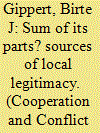| Srl | Item |
| 1 |
ID:
140791


|
|
|
|
|
| Summary/Abstract |
The article explores how the recent quest for local legitimacy in Iraq and Afghanistan has shaped the U.S. military notion of duty toward host citizens. It argues that military duty is conceptualized as a “host-citizen contract.” Based on a qualitative comparison of the 2006 and 2014 versions of FM3-24, the U.S. counterinsurgency field manual, it finds that U.S. forces are obligated to suppress insurgents, build host-nation agency, and protect the host population in exchange for legitimacy. The article's main finding is that the notion of legitimacy has changed in ways that fundamentally limit the scope of duty and justify a breach of contract should the host nation fail to comply.
|
|
|
|
|
|
|
|
|
|
|
|
|
|
|
|
| 2 |
ID:
120314


|
|
|
|
|
| Publication |
2013.
|
| Summary/Abstract |
With continuing challenges facing the international presence in Afghanistan, the need to secure local legitimacy, or 'winning heart and minds' of the local population is gaining increasing foothold in contemporary policy-making and academic debate on international intervention. However, knowledge of how international actors in the field understand local legitimacy remains limited. The purpose of this article is to take a first cut at examining how the two leading actors of international intervention - the UN and NATO - frame the issue of local legitimacy in Afghanistan, and to evaluate the potential impact of these findings on the prospects of inter-organizational coordination in the field. Based on a qualitative comparative analysis of statements issued in UN SC Resolutions, SC Debates, and S-G Reports (2001-2011) and NATO Declarations and Opinions (2003-2011), the study finds that the UN and NATO frame the issue of local legitimacy in surprisingly similar ways. However, the framing appears problematic in terms of how it depicts the relationship between the international presence and the Afghan state and its people. To illustrate, both the UN and NATO tend to externalize the issue of local legitimacy by linking it to the strength of the Afghan state rather than to the quality and effectiveness of international assistance and furthermore do not explicitly recognize Afghan civilians to have any autonomous influence on the level of local legitimacy. Instead, civilians are only portrayed to affect the level of legitimacy indirectly as the victims of insurgent or coalition attacks. The results of the study thus indicate a lack of awareness and self-criticism within the international intervention apparatus towards the potential pitfalls of international assistance, and it signals a lack of attention paid to the agency of local Afghans, which stands the risk of jeopardizing prospects for international civil-military coordination with Afghan stakeholders.
|
|
|
|
|
|
|
|
|
|
|
|
|
|
|
|
| 3 |
ID:
149497


|
|
|
|
|
| Summary/Abstract |
The article analyses the sources of local actors’ legitimacy perceptions towards international peacebuilding operations. Local legitimacy perceptions are increasingly recognised as shaping local behaviour towards international peacebuilding, which influences the effective functioning of the operation. Legitimacy debates in peacebuilding are either absent or imported from the literature on domestic legitimacy, without respect to the specific temporal and spatial situation of international operations. The article first explores which legitimacy sources influence local legitimacy perceptions of international peacebuilding operations. It finds that two sources are relevant: output and procedure. Second, it investigates how exactly legitimacy arises from them. In doing so, it demonstrates that output and procedure are umbrella terms comprising several sub-elements which influence legitimacy in different, sometimes contradictory, ways. Finally, the article empirically explores which of the sources are important to local actors’ legitimacy perceptions using field data from the EU peacebuilding operations EULEX in Kosovo and EUPM Bosnia-Herzegovina.
|
|
|
|
|
|
|
|
|
|
|
|
|
|
|
|